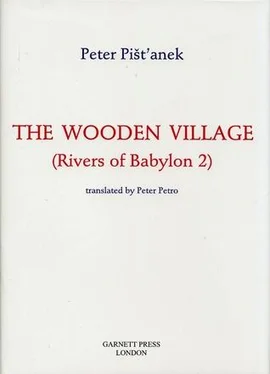Peter Pišťanek - The Wooden Village
Здесь есть возможность читать онлайн «Peter Pišťanek - The Wooden Village» весь текст электронной книги совершенно бесплатно (целиком полную версию без сокращений). В некоторых случаях можно слушать аудио, скачать через торрент в формате fb2 и присутствует краткое содержание. Год выпуска: 2008, Издательство: Garnett Press, Жанр: Современная проза, на английском языке. Описание произведения, (предисловие) а так же отзывы посетителей доступны на портале библиотеки ЛибКат.
- Название:The Wooden Village
- Автор:
- Издательство:Garnett Press
- Жанр:
- Год:2008
- ISBN:нет данных
- Рейтинг книги:3 / 5. Голосов: 1
-
Избранное:Добавить в избранное
- Отзывы:
-
Ваша оценка:
- 60
- 1
- 2
- 3
- 4
- 5
The Wooden Village: краткое содержание, описание и аннотация
Предлагаем к чтению аннотацию, описание, краткое содержание или предисловие (зависит от того, что написал сам автор книги «The Wooden Village»). Если вы не нашли необходимую информацию о книге — напишите в комментариях, мы постараемся отыскать её.
The Wooden Village — читать онлайн бесплатно полную книгу (весь текст) целиком
Ниже представлен текст книги, разбитый по страницам. Система сохранения места последней прочитанной страницы, позволяет с удобством читать онлайн бесплатно книгу «The Wooden Village», без необходимости каждый раз заново искать на чём Вы остановились. Поставьте закладку, и сможете в любой момент перейти на страницу, на которой закончили чтение.
Интервал:
Закладка:
“There’s a kind of a snack bar near where we’re parked,” says Mrs. Heilig to Mr Heilig. “Let’s go there. At least we can keep an eye on our car.”
The spouses walk past their white VW Golf and, as a precautionary measure, Siegfried Heilig tries all the doors. Then they head for the Wooden Village.
They are too hungry to look with their haughty revulsion at the noisy stokers and the smelly, eternally drunk Majerník; they make straight for the counter and buy a baked trout, marinated peppers and bread rolls. Siegfried Heilig queues for beer and brings two glasses of Bratislava crap beer to the table.
The Heiligs finish the food and chase it down with the liquid laxative. It doesn’t take long to have an effect. Mrs Heilig’s guts loudly begin to voice their displeasure. She quickly gets up and heads for the lavatory.
Eržika is already waiting there, holding out her bowl and a piece of toilet paper.
“Ein Mark, bitte,” says Eržika.
Mrs. Heilig uses the last of her strength to clench both cheeks of her thin German behind and rummages in her purse. Then, armed with the piece of paper, she disappears in the lavatory.
Mrs Heilig soon returns. She feels good. The sudden liberating decrease in the level of toxic products of digestion, together with the inebriating effect of Bratislava’s laxative beer, have made her normally grim, desiccated soul suddenly break into a euphoric smile.
Her eyes alight on the baby in the pram next to Eržika. The child has beautiful light blue eyes and blond hair. She smiles like an angel. Mrs Heilig smiles. Somewhere at the back of her brain something moves. Something like a stunted, aborted and impoverished maternal instinct suddenly opens her eyes, takes a breath and comes to life. Mrs Heilig crouches by the child. Her heart skips a beat. The euphoria is gone; only sadness remains.
Mrs Heilig, too, could have had an angel like that. Instead she always had herself dilated and curetted. The little souls of the innocents, five white and one black, have hovered all her life behind her, wherever she goes. Nobody can see them, not even Heilig. Only she knows about them. Occasionally, she wakes up in the night and hears their thin, childlike voices: “Mummy! Mummy!”
Heilig holds little Lady in her hands and tears burst from her eyes.
Eržika is alert, but utterly baffled. She hisses a warning to Feri. Feri comes, his chest puffed out. They both look uncomprehendingly at the gaunt German woman kissing their little daughter.
Siegfried Heilig is on his second liquid laxative. Mrs Heilig joins him and wipes her tears.
“What happened?” Heilig asks.
“Nothing,” says Mrs Heilig. “Why do you ask?”
“You’re crying,” says Heilig.
“Really?” Mrs Heilig says.
“Why are you crying?” Heilig is curious. “Did anything happen?”
“No,” Mrs Heilig says. “The lavatory woman has a beautiful baby. I’ve never in my life seen such a beautiful baby.”
“Hmm,” says Heilig.
He, too, finds his wife’s barrenness hard to cope with.
“A gorgeous little angel,” says Heilig.
“Boy or girl?” asks Siegfried Heilig, without any real interest.
“A girl,” says Mrs Heilig. “She’s got little earrings. Please, get me a cognac.”
Heilig sighs and goes to the bar. He quickly comes back with a shot of rum.
Mrs Heilig tosses back the rum and asks for another one. Heilig feels vaguely guilty and goes back to the bar.
“Strange,” says Mrs Heilig, after knocking back a second rum, “that the child is so beautiful.” She saw her parents; she simply cannot understand how such two puny Dinarian type degenerates could have produced a little angel with decidedly Aryan looks.
“Aryan looks, you say?” Siegfried Heilig asks.
“Go and take a look,” Mrs Heilig suggests.
Eržika was puzzled at seeing the gaunt German broomstick again, this time accompanied by her husband. However, Lady in her pram is very happy.
“ Kak zovut yiyo ? What’s her name?” Mrs Heilig asks Eržika in Russian.
Eržika, unlike the two East Germans, was never on friendly terms with Soviet soldiers, so she doesn’t understand, and shakes her head.
“ Kakoe imya ? What name?” Mrs Heilig asks.
Eržika stares at them.
“A beautiful baby, right?” Mrs Heilig asks her husband longingly.
Siegfried Heilig nods in silence. He, too, imagined his life enhanced by the cheerful laughter of children. Whenever this seemed within reach for him and his wife, they considered their financial resources and Siegfried Heilig sent her to be dilated and curetted, instead. And when they could finally afford it, Mrs Heilig turned out to be infertile.
Heilig turns round. Feri Bartaloš, standing in his white coat midway between the snack bar and the lavatories, is discreetly following them.
Siegfried Heilig felt sharp hatred for the inferior Slavs who can have such a beautiful child whenever they feel like it. This is something stronger than the ordinary racial hatred that Siegfried Heilig feels in his homeland for Russians and similar degenerates. This is the hatred of Heilig’s Aryan genes that vainly long to replicate themselves in his wife’s Aryan womb. This is hatred felt by sperm desperately wandering for hours through the dark labyrinth of fallopian tubes, looking in vain for the one healthy egg which they could bite through and thus start a new life. Siegfried Heilig looks at Bartaloš and feels humiliated.
Lady calmly lies there, her big blue eyes watching with fascination. Her attention is held by the unusual caressing tones of the strange woman’s speech.
“Time we were off,” Siegfried Heilig says cautiously to his wife. “Let’s go.”
They return to the hotel.
Mrs Heilig cries all night.
Next morning, Siegfried Heilig plans an early departure.
“Let’s stay at least another day,” says Mrs Heilig.
“What for?” Heilig asks, but he knows the answer.
They go to the Wooden Village and have breakfast.
Then they silently walk round the city. Their itinerary circles round the Wooden Village and the angelic baby smiling in its dirty pram.
“If we leave now,” Mrs Heilig admits to her husband, “I’ll feel as if I’ve left somebody behind. A piece of myself.”
“Are you mad?” Heilig asks good-naturedly, pouring the liquid laxative down his throat.
“Let’s have another look at that little girl,” Mrs Heilig begs.
It’s evening. The neon lights are on. The pavements are full of pedestrians.
Eržika feels out of sorts. Those Germans have been here at least a hundred times today. But Lady just happily stretches her arms out towards the strange lady. The strange lady gives her a present, a plush teddy bear that she bought in the city this afternoon.
“Well, let’s go,” says Siegfried Heilig and gently but forcefully pushes his wife towards the exit.
Soon they leave Wooden Village and walk towards the hotel.
“You’ve no idea how unhappy I am,” says Mrs Heilig.
Heilig says nothing.
On the pavement, a man in the white coat, the baby’s father, runs up to them.
“Hey Herr! Hey Herr!” Feri Bartaloš cries in a muffled voice.
The Heiligs turn around and wait for him.
“ Kaufen Kinder ? Want to buy a kid?” Bartaloš asks them in a whisper. “ Nicht teuer, sehr billig ! Not expensive, very cheap.”
The Heiligs look at each other and then at Feri.
“ Meine Kinder kaufen , buy my child,” Feri says. “ Nicht krank, sehr schön kinder. Nur zwei tausend mark! Sehr billig ! Not sick, very beautiful child. Only two thousand marks. Aber … But…”
Feri Bartaloš puts a finger over his lips.
Читать дальшеИнтервал:
Закладка:
Похожие книги на «The Wooden Village»
Представляем Вашему вниманию похожие книги на «The Wooden Village» списком для выбора. Мы отобрали схожую по названию и смыслу литературу в надежде предоставить читателям больше вариантов отыскать новые, интересные, ещё непрочитанные произведения.
Обсуждение, отзывы о книге «The Wooden Village» и просто собственные мнения читателей. Оставьте ваши комментарии, напишите, что Вы думаете о произведении, его смысле или главных героях. Укажите что конкретно понравилось, а что нет, и почему Вы так считаете.












